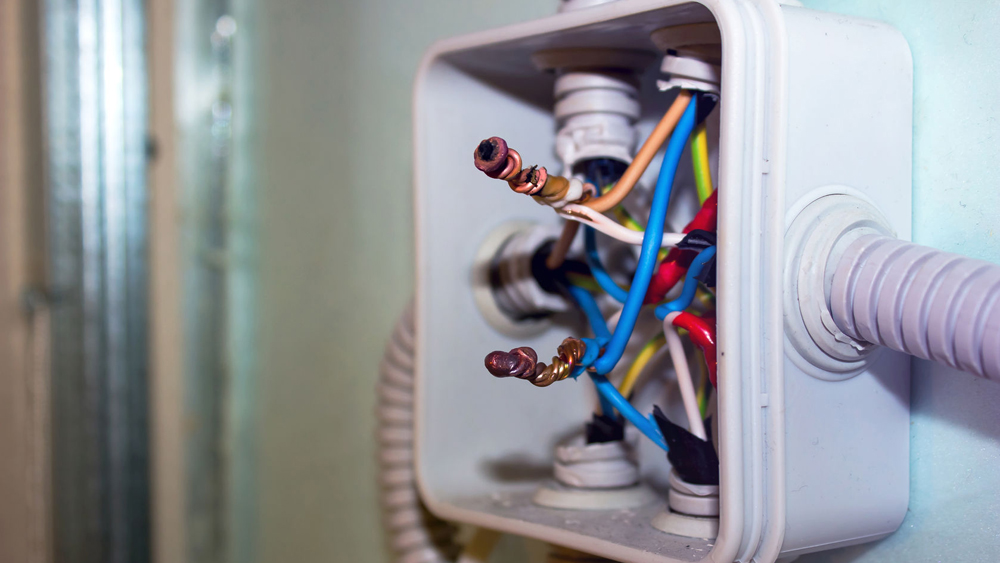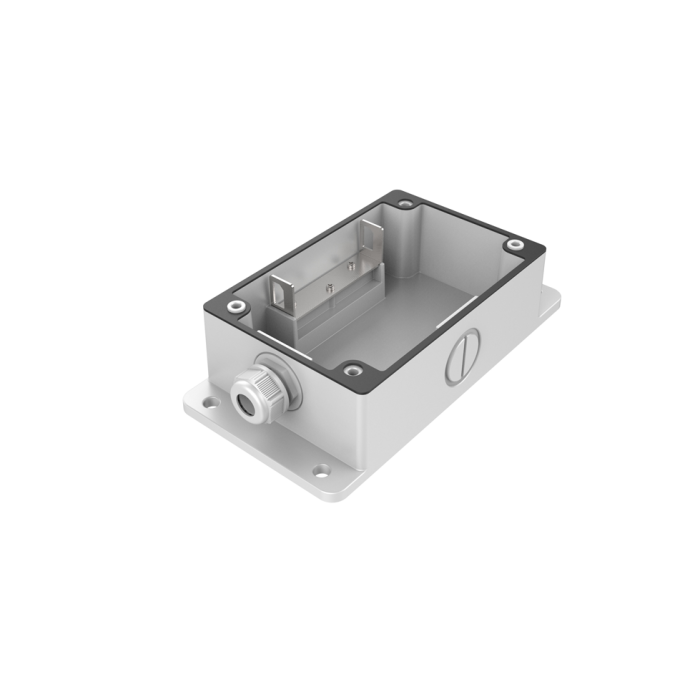Fine Beautiful Tips About How Long Can You Stay In A Junction Box

How To Install An Exterior Junction Box Wiring Diagra Vrogue.co
Decoding the Mysteries of the Junction Box
1. What's the Deal with Junction Boxes, Anyway?
Alright, let's dive into the electrifying world of junction boxes! These unassuming metal or plastic enclosures are the unsung heroes of your electrical system. Think of them as tiny apartments for wire connections. They keep those connections safe, organized, and prevent accidental shocks (which, trust me, nobody wants). But, like any good landlord, there are rules about how long things can "stay" in there, or rather, what can stay. It's less about time, and more about what's allowed in the space.
The burning question: can you physically stay inside a junction box? Well, unless you're a microscopic electrician, the answer is a resounding NO. Junction boxes are designed for wires and connectors, not human habitation. Trying to squeeze yourself in there would be a truly shocking experience (pun intended, of course!).
So, while you cant literally stay inside a junction box, the question highlights a common concern: what can and should reside within its metallic or plastic walls? It's all about understanding the purpose and limitations of these electrical safe havens.
Think of a junction box like a carefully curated spice rack. You only want the essentials in there, neatly organized, and nothing that could cause a mess or a fire. Let's move on to what actually can and should be in a junction box.
:max_bytes(150000):strip_icc()/how-to-install-junction-boxes-1152327-03-cc9cd72574d0466aa2c17a9c0305e33e.jpg)
The Permitted Residents
2. What Makes a Good Tenant (Inside a Junction Box)?
Okay, so we've established that human occupancy is strictly forbidden. But what about the electrical components that are meant to be in there? The answer is simple: wires and connectors, and nothing else. These are the only "legal residents" of a junction box. Think of it as a very exclusive gated community for electrical connections.
The wires themselves must be properly rated for the voltage and amperage of the circuit. Using the wrong type of wire can lead to overheating, insulation breakdown, and even fire. And nobody wants a fiery eviction notice!
Connectors, such as wire nuts or terminal blocks, are used to securely join the wires together. These connectors must also be properly rated and installed to ensure a reliable and safe connection. A loose connection is like a leaky faucet — it can cause problems down the line.
The main idea is that everything inside the box has a specific, electrically-related purpose. Dont go trying to store your spare keys or loose change in there. Junction boxes are for electrical connections and protection, period.

The Eviction Notice
3. Forbidden Items
Now that we know what can be in a junction box, let's talk about what's strictly prohibited. This is where things get serious. Putting the wrong things in a junction box can be dangerous and even illegal.
First and foremost, no random objects! This includes things like screws, nails, paper, cloth, or anything else that isn't directly related to making electrical connections. These foreign objects can interfere with the connections, cause short circuits, and create a fire hazard. Imagine trying to host a dinner party in your spice rack — total chaos!
Secondly, no splices outside the box! All wire splices must be contained within a junction box. Leaving a splice exposed is a recipe for disaster. It's like leaving your wiring vulnerable to the elements. Think about it: exposed wires are susceptible to damage, corrosion, and accidental contact, all of which can lead to serious electrical problems.
Finally, no overfilling the box! Junction boxes have a limited capacity for wires and connectors. Cramming too much into a box can overheat the connections and create a fire hazard. It's like trying to squeeze too much luggage into an overhead compartment — something's gotta give, and it's usually not pretty.

Electrical Wiring Box
Size Matters
4. Box Fill Calculations
So, you've got your wires and connectors, and you're ready to make some connections. But wait! Before you start stuffing everything into the junction box, it's important to make sure there's enough room. This is where box fill calculations come into play. Think of it as playing electrical Tetris — you need to fit all the pieces in without overcrowding.
The National Electrical Code (NEC) provides guidelines for calculating the maximum number of wires and devices that can be installed in a junction box. These guidelines take into account the size of the box, the gauge of the wires, and the number of devices (such as switches or receptacles) that are connected to the circuit.
Overfilling a junction box can lead to overheating, damaged insulation, and even fire. It also makes it difficult to make proper connections and can increase the risk of loose connections. A properly sized junction box ensures that the connections are secure, the wires are protected, and the system operates safely.
Imagine trying to assemble a complex Lego set in a tiny shoebox. It's frustrating, time-consuming, and the end result is likely to be a mess. Similarly, trying to cram too much into a junction box is a recipe for electrical disaster. Take the time to calculate the box fill and choose the right size box for the job.

Electrical Junction Box Wiring
Staying Compliant
5. Code Compliance
When it comes to electrical work, following the rules is not just a good idea — it's the law. The National Electrical Code (NEC) sets the standards for safe electrical installations. These standards are designed to protect people and property from electrical hazards.
Violating the NEC can result in fines, penalties, and even legal action. More importantly, it can put you and your loved ones at risk of electrical shock, fire, and other dangers. Think of the NEC as the electrical constitution — it's there to ensure a safe and just electrical system for everyone.
Electrical inspectors are responsible for enforcing the NEC. They inspect electrical installations to ensure that they comply with the code. If an inspector finds a violation, they can require you to make corrections. Ignoring an inspector's orders can lead to serious consequences.
Properly installed and maintained junction boxes are essential for code compliance. They protect wire connections, prevent accidental contact, and reduce the risk of electrical hazards. So, when it comes to electrical work, don't cut corners. Follow the rules, stay safe, and avoid the wrath of the electrical inspector. Remember, a little extra effort now can save you a lot of headaches (and potentially your life) later.

Frequently Asked Questions (FAQ)
6. Your Burning Junction Box Questions Answered
Let's tackle some of the common questions that often pop up about junction boxes.
7. FAQ 1
Absolutely! That's one of the primary purposes of a junction box. Just ensure the box is properly sized for the number of wires and connections, and that all connections are made securely with appropriate connectors. Remember, every wire connection needs to happen inside a box thats accessible.
8. FAQ 2
Thats precisely why junction boxes exist! They must always be accessible. Never bury a junction box behind drywall or in a place where you can't easily get to it. The cover needs to be removable without damaging the surrounding structure.
9. FAQ 3
Generally, yes. If the wiring system includes a grounding conductor, the metal junction box should be grounded. This provides an extra layer of safety in case of a fault. Plastic boxes, of course, dont need grounding.